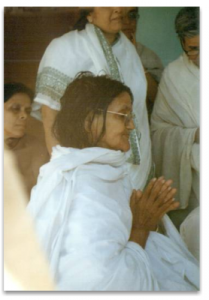 Anandamayi Ma is a woman-saint of Bengal who lived from 1896 – 1982. Anandamayi Ma defied all conventions, initiated herself and her husband into the sacred state and often gave signs and displays of a divine incarnation. Ma was not attached to her devotees (she had many) and was honoured and venerated as a divine incarnation toward the end of her earthly sojourn. She wrote no books and gave very simple teachings to her devotees. Her name means “Ever-blissful Mother”.
Anandamayi Ma is a woman-saint of Bengal who lived from 1896 – 1982. Anandamayi Ma defied all conventions, initiated herself and her husband into the sacred state and often gave signs and displays of a divine incarnation. Ma was not attached to her devotees (she had many) and was honoured and venerated as a divine incarnation toward the end of her earthly sojourn. She wrote no books and gave very simple teachings to her devotees. Her name means “Ever-blissful Mother”.
Anandamayi Ma, East Bengal, 1896 – 1982
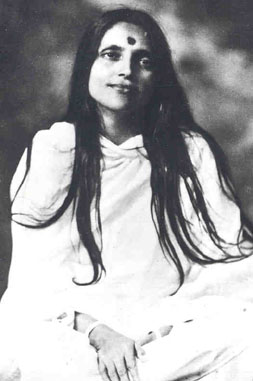
In answer to Paramahamsa Yogananda’s question to her, “Ma, tell me a little of your life”, Anandamayi Ma replied:
Father, there is little to tell. My consciousness has never associated itself with this temporary body. Before I came on this earth, Father, “I was the same.” I grew into womanhood, but still “I was the same.” When the family in which I had been born made arrangements to have this body married, “I was the same.” And, Father, in front of you now, “I am the same.” Even afterwards, though the dance of creation changes around me in the hall of eternity, “I shall be the same”.
Early Years

Anandamayi Ma was born in East Bengal (now Bangladesh) in 1896. She was the second eldest child to a pious, highly orthodox, impoverished brahmin couple whose first daughter had died in infancy (three sons would also die in early childhood). Her devout mother had enjoyed a number of auspicious dreams of gods and goddesses before Ma’s birth – a sign usually indicating the presence of an imminent mahatma. She was named Nirmala Sundari and only attended school for two years. She was married at a young age, to Mohan Chakaravathi, who later became her disciple and a Guru before his death from tuberculosis. She renamed him Bholanath. After marriage at 13, her husband was relatively peripatetic and not home. Nirmala spent a few years living in her brother-in-law’s house, most of it apparently in Samadhi. She had a difficult time concentrating on housework. When her brother-in-law died and she went to live with her husband.
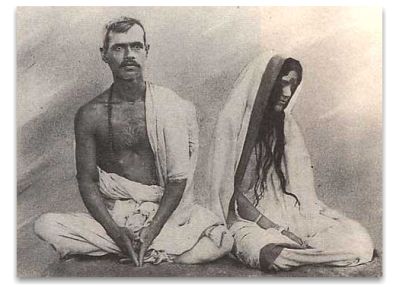
Anandamayi Ma with Her husband Ramani Mohan
(later known as Bholanath)
In 1914, Ma, now 18 years old, went to live with her husband Bholanath at Astagrama in East Bengal. The marriage would never be consummated: when Bholanath once made a move to initiate conjugal relations, he felt a violent electric shock surge through his body and took it as a sign that the time was not yet ripe for such things. It was while the two were living at a house in Astagrama that Hara Kumar Ray, brother of the landlord, began to view Ma as a spiritual Mother, a holy figure. One of Bholanath’s friends also prostrated to her around this time, addressing her as “Goddess Durga.” One evening Ma was observed to go into a deep trance during a public kirtana (devotional singing session); this lent further weight to her increasing reputation for possessing an extraordinary spiritual radiance.
In 1916, Ma fell seriously ill and went to live with her parents. She joined Bholanath again two years later at Bajitpur in the Mymensingh district of East Bengal. Here began the “play” of spiritual practice – a spontaneous adoption by Ma of various yogic behaviours. Yet she clearly knew in her deepest being that none of these were at all necessary for her and that she had nothing to gain by them. She never strove to attain anything, she never had a guru, and she never consulted any scriptures or books on yoga. It was simply the case that, sitting in their room at night, after impeccably carrying out the household chores during the day, an inner guidance brought forth through her ancient Sanskrit verses and sacred phrases (mantras) which she had never previously heard as well as images of the different aspects of God. Moreover, Ma’s body would spontaneously go into highly advanced hatha yoga postures normally inaccessible except to those who had done years of training. When she asked who or what this inner guidance was, the reply came, “Your Shakti [Divine Power].” It was then revealed to Ma, “You are everything“, after which, as she stated: “I realised that the Universe was all my own manifestation … I found myself face to face with the One that appears as many.”
Divine Self Initiation
After initiating herself in 1922 (in an action that stunned observers) she initiated her husband and gave him the sacred thread five months later:
On the night of August 3, 1922, Ma was guided by her inherent shakti-power to engage in a self-initiation rite: she herself played the roles of guru and disciple, uttering an arcane bija mantra (“seed” – syllable), which she then repeated for a while. This unprecedented self-initiation rite shocked one of Ma’s cousins, since Ma thereby seemed to be setting herself up as spiritually superior to her uninitiated husband. She promised this cousin that Bholanath would also soon be initiated. Sure enough, five months later (December 1922), Ma again broke with customs by herself giving him mantra-initiation, sending him into deep trance for two hours! Ma followed in full all the details prescribed by the ancient scriptures, though she had never studied them. It was at this time that she declared to Bholanath and an esteemed astrologer/scholar that she was none other than the full Incarnation of God, “Poorna Brahma Narayana“. Her demeanour during this astonishing disclosure was noticeably luminous.
While living in Dhaka, others came to recognise her spiritual qualities. At the sound of religious chanting, she would become stiff and even fall to the ground in a faint. Her body would occasionally become deformed during these events. Sometimes it would lengthen. At others, it would shrink or its limbs would seemingly go into impossible positions as if the skeletal structure had changed shape beneath her skin. She would hold difficult yogic positions (asanas) for long periods and spontaneously form complex tantric hand positions (mudras) and gestures.
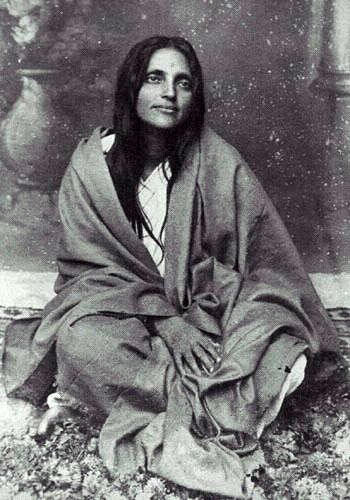
Cost of Divinity
Sometime in 1924 Ma had lost the ability to feed herself. Her fingers simply would not hold onto any food. Henceforth, she would be hand fed by a devotee, if she ate anything at all. Ma frequently fasted for lengthy periods. Once she abandoned all food and liquid for 23 days. For one six month period she ate only six grains of rice daily and 2 or 3 ripe fruits that had to have fallen off the tree – and Ma clairvoyantly knew which had fallen and which had not!
Anandamayi was sensitive to environmental influences as was demonstrated when she once passed a Muslim tomb. She immediately began to recite portions of the Quran, and to perform the Namaj ritual (Muslim prayers). These and other similar acts showed Anandamayi to be someone always moving through a wide variety of psychic and religious states, each one expressing itself through her. She often objectified her body by describing her actions in phases like “this body did this” or “this body went there”. She believed her chaotic actions were expressions of the divine will.
While sometimes speaking of spiritual evolution, she also maintained that her spiritual identity had not changed since early childhood. She claimed that all the outer changes in her life were for the benefit of her disciples. She sometimes would express a variety of roles, and later explain that this was a performance staged to teach one of the people present some lesson. However, such actions were not a function of her will and occurred without planning or intent.
Anandamayi Ma and Gandhi
Whereas Ma most often referred to herself impersonally as “this body” or “this little daughter of yours,” she would usually warmly greet her married visitors as “Father” or “Mother” and everyone else as “Children” or “Friend”. Often she would tell them that in coming to meet her, they were simply coming to meet their own Self. Ma was repeatedly invited to the Sevagram Ashram of Mahatma Gandhi. Dr. Rajendra Prasad and Acharya Vinoba Bhave came to have her darshan. Vinobhaji repeatedly said that Gandhi was very eager to meet Ma.
Ma and her followers were taken to Sevagram by Kamalnain. Gandhi greeted her and addressed her as ‘Mataji’ and Ma reciprocated by addressing him as ‘Pitaji’. Mahatmaji took her in his arms like a little child and she turned into one hiding her face in his chest. Gandhiji’s first words were “Perhaps you know that it was I who sent Jamnalal to you. He came back and told me that he got the peace of mind from you which I failed to give him” Mentioning Kamala Nehru’s devotion to Ma, Gandhi told those present that Kamala used to treat her as her Guru. Ma immediately protested: “Pitaji, I cannot be a Guru to anyone. I am just a little girl.”
The two spent the whole day like a little daughter meeting her father after a long time. Gandhi would not leave her. Even at night the two slept in adjacent beds. At night, Kasturba (Gandhi’s wife) came once to pay her homage to Ma and said, “This is my great fortune that I have got your darshan.” Gandhi asked her to stay back in Sevagram for at least two days. But Ma in her own mood decided to leave the next day.

Play of the Atma
(atma means soul principle; the atma is a spark of the divine itself within)
Ma’s visitors and devotees came from all ages and walks of life, and from different religions and nations. Westerners have been visiting Ma since at least the 1940’s; one of these, Mrs. Blanca, a former Austrian aristocrat, would become a renunciate under Ma, receiving from Ma the name “Atmananda”. This lady, who outlived Ma by only several years, performed for Westerners an invaluable service by translating Ma’s teachings into English and other European languages.
These visitors experienced her variously as the magnificent, mysterious divinity in human form; as an attentive, consoling mother; as a strict disciplinarian (whose advice always turned out to be the best course of action); as a joyous, confident woman; and as a playful, gleeful, sometimes mischievous girl. Regarding these last two roles, it was clear that, for Ma, all is God’s play, not a matter for grief nor fretting. She would urge them to trust in God, who is the deepest reality, to merge attention in Him Who is both formless and manifesting as all these forms, and let any work or duties flow spontaneously through the body without being attached to the fruit of the action.
A number of times Ma would, in the midst of conversation, begin to laugh with a rich, resonant, rhythmic laugh. Sometimes in the midst of singing a traditional devotional song (Ma would often sing them with a uniquely rich way of pronouncing the names of God), she would start laughing – and continue with this laughter for lengthy periods, as if to say, “Don’t worry – Be happy!” “Ja hoye jay” was the most frequent of her pithy East Bengali aphorisms; it means, in effect, “let come what may, all’s well, all is God’s wondrously intelligent, benevolent play.”
Anandamayi Ma wrote no books. She travelled extensively through all India and established many ashrams affording the opportunity for women to follow the celibate life called brahmacarini. Ma attended festivals wherever she went, and often attended the Kumbh Mela. (Kumbh Mela is is a mass Hindu pilgrimage of faith in which Hindus gather to bathe in a sacred river. Bathing in the river at these events cleanses one of all sins.) Although Anandamayi Ma did not formally consider herself a guru she had many ashrams and devotees. Ma taught by doing. One way she frequently taught those devotees was to leave them quickly.

Ma and Detachment
Once, she set out for Bhimtal where one day she experienced travelling in an ethereal form to be with Sri Aurobindo. After some time she moved to Nainital where, one day, during a Kirtan (singing, sacred chanting), she suddenly found that the congregation comprised a myriad Krishna’s. There was just one image of Krishna but in her eyes all participants had turned into living Krishna’s. A similar thing happened in a gathering singing the glory of Rama. In her eyes, all those present had been transformed into Rama. Speaking about high significance of singing the Holy Name of God, Ma said one day “It is not being suggested that you leave everything behind and run away. Be with the world and its various demands, but keep a fire burning – the fire of His name. If He chooses to bless you, then this fire will burn all impurities and lead your pure soul unto Him. Live your life in this world but keep Him along.”
At Sitapur, a saint asked “How does one get rid of sorrow? There is no end to want.” Ma said, “You are living in a foreign country and you are unhappy. Find out your homeland, find yourself, and your unhappiness will end. And the foreign country is a product of your own desires and wants. These will vanish when you find your own territory, your own self.”
Ma and the lessons of Karma
Once a man named Pannalal came with a problem. His friend had been continuously doing sadhana for 20 years without any spiritual achievement and had now decided to leave the path in disgust, having lost faith in God. Ma told him that mere practising was not enough unless one could get rid of Lust, and desire. “If you hold on to the chain while taking a bath, you can never have a proper dip.” Again, “The old practices and beliefs stand in the way of getting to the Truth.” Pannalal’s wife used to pray and meditate hours on end everyday and yet she died in pain of cancer after a prolonged illness. Why did she suffer like that? Ma said, “One accumulates the effects of habits, practices and beliefs over several life cycles. Don’t you think it is His mercy if all the accumulated ill effects are washed away through the suffering in just one life cycle?” Dwelling on his friend’s doubt, Pannalal asked, “Can one see God?” Ma’s clear reply was, “You can see Him the way I see you now or you see me here – there is no difference. You can achieve HIM more intimately if you have a yearning to achieve and feel Him.”
Spirituality and Family
Early January in 1945, Ma was in Vindhyachal, then she moved to Brindavan with her followers. She broke the silence she had been observing in presence of Muktibaba. Speaking about Brahmacharya (the life of celibacy) she said that it was better to become an ideal family man than to become an aimless brahmachari (celibate). In her view; “There is nothing wrong in leading a virtuous family life. It is good for some people to strive to move close to God through marriage.”
Shortly after, Ma attended a function organised by Muslims. After excerpts from the Holy Koran were read, several speakers discussed various aspects of religion. By her presence, Ma emphasised that in essence every religion had the same message; the disputes were over the external attributes and rituals. The quest of the Indian mind was to seek a synthesis of all religions. Ma indicates that she felt that there was no contradiction between the family life and pursuit of spirituality. In her opinion one should act according to the situation.
On the Death of Gandhi
One day, speaking about the ways of God, she said, “Frequently, you lament over the unkindness of God, when you are merged in sorrow; but the point is that He dispels danger only by creating danger. No one would move towards Him unless one passes through sufferings”. At the end of the festival in Calcutta, Ma moved towards Allahabad. She attended several functions at Kashi, Allahabad, Vindhyachal and Jhusi. She returned to Allahabad from Jhusi, when the shocking news of Mahatma Gandhi being shot dead was received in the evening.
Ma’s immediate reaction was “It is like Jesus Christ“.
Speaking about Gandhi, Ma said “Jesus Christ absorbed the entire violence within his own body before laying it down. He did not have any animosity even towards violence. Similarly, Gandhiji also vanquished violence with his force of Ahimsa (practice of non-violence). He fell down calmly taking the name of Ram, with his palms joined together in prayer”.
Ma and Mataji
At Madras, a devotee asked the way to reach God. Ma said “Cry for Hari and you will get Him”. The questioner said he was incapable of crying. Her reply was, “In that case, keep company of those who can”. On freedom from bondage, she said, “Attachment to Him brings joy and freedom. The former attachment gives you a return ticket; you have to shuttle between two points (without getting free)”. Ma moved on toward Pondicherry. At eleven in the morning that day she had a meeting with “The Mother”, who stood in the sitting room of Sri Aurobindo. Mother looked at her for a long time with a fixed gaze as Ma looked at her with a natural poise. Mataji presented Ma with a rose, a ‘ball’ flower (globe lily) and two pieces of chocolate. Ma returned the rose and one piece of chocolate. Mother kept the chocolate but gave the rose back. This exchange of flowers was repeated twice or thrice after which Mother tore a portion off the rose and returned the rest to Ma. The same evening the two had another meeting at the same place. Mother was distributing roasted peanuts to visitors with a spoon from a wooden container. She offered some to Ma who said, “This little girl is the youngest of all.” Mother said in English “Forever a little child.” The singer-saint Dilip Roy, an inmate of Pondicherry, met Ma several times during her stay and sang before her.

When the Kumbh Mela was held in Allahbad, Ma was in attendance. In this most unusual incident, she displayed the formless aspect of divinity, not limited to her body.
Millions of people from all corners of India assembled in Allahabad that year on that occasion. A camp was set up also by Anandamayee Sangh to receive devotees. Mohantas (high priests) of three sects – Dasnami, Udasi and Vaishnav were honoured and had lunch one day at the camp. The Shankaracharya of Jyotirmath also paid a visit one day. The auspicious moment for the holy dip fell in the small hours of the night of February 3. As Swami Paramananda left with a hundred devotees for the dip at three in the morning, Ma looked unusually disturbed. When the second batch left the camp a few minutes afterwards, Ma told them to chant God’s name all the while. At nine in the morning Ma lay down and suddenly cried out, “There, they are being crushed, stampeded, there they cannot breathe.” Shortly, the sad news of hundreds of devotees having been stampeded to death was received. Ma said, “It was clear before the eyes the whole incident with piles of dead bodies”. Later, while returning to Kashi, she said, “When the tragedy occurred, it was as if this body was being crushed and it was this body that was losing breath.”
On Conquering Fear
Ma’s birth anniversary was celebrated at Solan one year. The Governor of Himachal Pradesh came to have her darshan (sight of a holy person; confers blessings). The birth anniversary was celebrated in royal grandeur under the supervision of Jogibhai Raja of Solan.
Ma felt at ease in the calm and quiet atmosphere of Solan and devotees could approach her easily. Once talking to a group of young men Ma said, “You can conquer fear if you think of God. He is the soul – the life force. You cannot but remember Him whether you are alone or in the company of religious persons. Unless you call Him you cannot get free from the shroud that covers you. Never try to bribe your way to God. If you try to deceive, you will be deceived yourself.” On reaching God while leading a family life, she said “Turn your house into a temple of God. Whosoever stays in my house are images of God and I shall serve them as a manager. If you can live in this spirit there is every chance of your becoming a true servant of God in good time.” On peace, she said, “Peace does not lie in wealth or hold over men. You can never achieve peace unless you have the feeling that you have an identity which is unperturbed, is knowledge and is consciousness.”
Ma returned to Kashi Asharam. During a religious discourse there, a devotee asked whether any particular name of God when recited would lead to Him more quickly. Ma said, “All names given to God have the same power. You can reach your destination by taking any name you like. The more intense your sadhana (spiritual practice), the quicker you reach Him. Take it lightly and you take more time.”
Devout Mistake
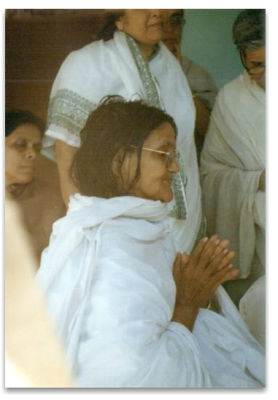
Once Ma went to Kishenpur Ashram for a week. Shortly after, Ma was at Kankhal. She was surrounded by devotees. An old lady bowed in pranaams (respectful humble greeting to guru or spiritual leader) before an American lady, mistaking her for Ma. When she realised her mistake, Ma assured her, “You have done the correct thing. There is just one Lord, everything else is of no consequence. To whomsoever you may bow your head in reverence, the offer is being made to the Lord. For that matter, all creatures, plants and even inanimate objects are nothing but the manifestations of God.”
Ma was moving from place to place. From Vrindavan she came to Kashi, then went to Vinchyachal, Kashi again, Hardwar, Kankhal, Dehradun and then to Patiala. Before leaving Kashi for Hardwar, Ma’s message to Dr. Gaurinath Shastri at the railway station was: “Look, Baba, everybody is your friend, a well-wisher. Everybody possesses the same soul – the Supreme Soul. All are linked with one another; the One manifests itself in all forms. You are the father and the husband as also the son. You are everything that exists. This body is linked with everything and everything is but of One soul.”
End of the Earthly Sojourn
1982 was the last year of Ma’s earthly sojourn in that body. That year she began to show the signs of wear resulting from her constant giving and travelling and the various illnesses she had taken on over the years. (One of the phases or gifts of divine incarnations is they may take on the illness and sufferings of their devotees.) By March 1982, her physical form showed symptoms of an undiagnosed ailment that baffled doctors. She was examined by the best doctors available who could not pronounce an illness in her body or even diagnose Ma effectively.
During January of 1982, Ma visited Allahabad on the 9th for the Kumbh Mela. The Mahants of the Nirvani Akhara took her next day in a huge procession to the fair ground where Ma formally inaugurated the Khumb Mela. She was again taken in a procession to the confluence of three rivers on the Makara Sankranti Day on the 14th. While all others took a holy dip, Ma sprinkled a little water on herself and on others standing close by. Ma stayed at the Anandamayi Camp from January 10 to 25. There were streams of visitors, seeking her darshan, including the high and low, the distinguished and the commoner, and all were blessed by her despite her failing health. The Mahamanda-leshwars who came in their numbers, made respectful reference to her divinity in their speeches.
Late March of 1982, Ma left for Delhi on her way to Tripura. She reached the capital, Agartala, after nearly three and half days of arduous journey. An Ashram was being set up there by the devotees of Ma, the Ananadamayee Sangha. The land along with an old temple of Uma-Maheshwar had been donated by Maharaja Manikya Bahadur for the purpose and the local devotees had been waiting for about three years for Ma’s arrival.
On March 31, Ma entered the Ashram for its formal inauguration. Nearly 50 thousand people, who eagerly waited for her darshan, were blessed by her. The next day, she visited the temple at the royal palace at the special invitation of the Maharaja. The royal family accorded a fitting reception to her. From Agartala, Ma travelled to Dharmanagar and Bongaigon before returning to Calcutta. On April 10, she was back in Kankhal. She looked exhausted, needing immediate rest.
On the Guru Poornima Day on July 6, Brahmachari Bhaskaranand performed her worship in the verandah as Ma lay in her bed. She herself restricted the darshan to once a week – half-an-hour every Sunday. Darshans had already been completely stopped for quite some time. A number of devotees came for her darshan on July 11. Among them were Prime Minister Indira Gandhi, with her sons and daughters-in-law and her grandchildren. Indira Gandhi had rushed down from Delhi on hearing the illness of Ma. For a few minutes Ma sat up on the bed and spoke to her. This was the last time that Ma sat up on her own to give darshan to anybody.
Ma’s condition deteriorating day by day. In the night of July 23, Ma told Mrs Khaitan, “Tomorrow morning ‘this body‘ will move to Kishenpur Ashram”. On arrival at Kishenpur, next morning, she was seated in a chair kept in the courtyard to be taken straight to her room. Anandamayi Ma never came out of her room in the first floor after this day. Only her lifeless body came out in the morning of August 28.
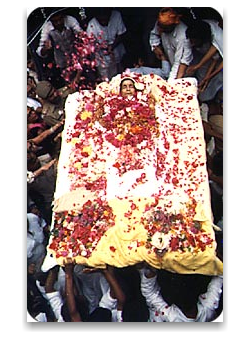
Once Ma took a trip to Lucknow. While returning, she received at the railway station the news of the death of one Jamnalal Bajaj. He used to be a child in Ma’s presence. When someone was lamenting his death, Ma said, “Who goes away – who else is that arrives? What is the distinction between life and death? One who passes away, in fact, merges into the One who is ever-existent.”
Once Ma composed a verse impromptu as an answer to a devotee’s letter:
Leave aside every other thought,
Just say Hari, Hari,
Have faith in Him,
And cross the sea of world.
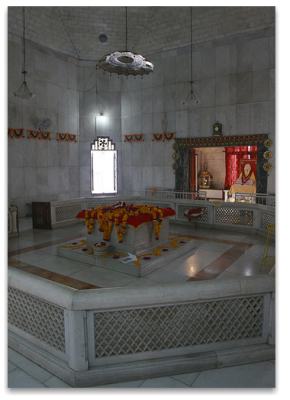
Parable of the Necklace
A precious necklace was seen flashing from the bottom of a lake. Many felt tempted to recover the valuable ornament and dived deep into the water for it, but found no necklace anywhere. Yet it was clearly visible to everyone from the edge of the lake. They were all puzzled. Eventually they realized that there was no necklace at the bottom of the lake; what they saw was its reflection in the water. They looked up and discovered the precious ornament hanging from a tree. A bird must have picked it up from somewhere and deposited it there.
God who dwells within you is the source of true happiness. In the objects of the senses this happiness is merely reflected. The individual, misled by birth after birth by having only a glimpse of this reflected joy, thinks that this is the real thing, namely sensuous delight. So long as one believes that true happiness can be had in sense objects without searching within, one will never taste true happiness. The kingdom of God, hence of happiness, is within you.
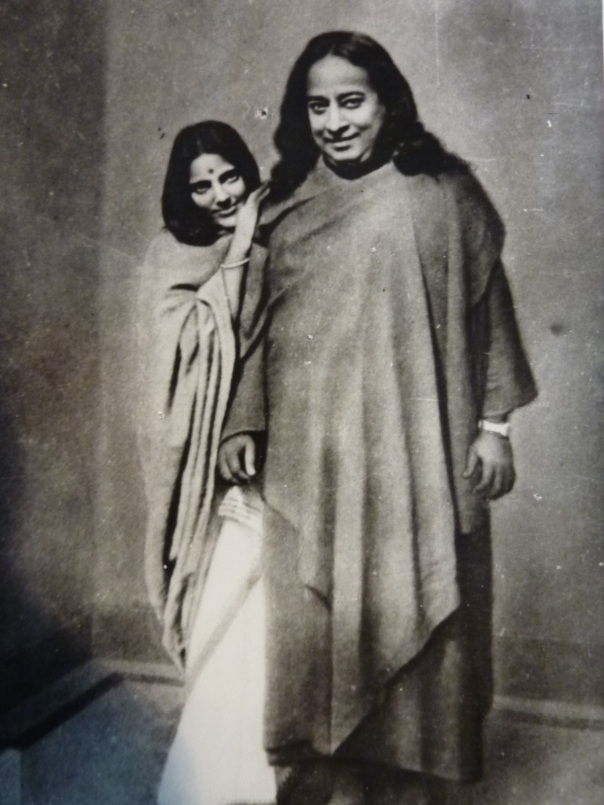
Old Friends …
This page last updated 12 October 2019
This page first updated 4 April 2001
© Saieditor.com
![]()

